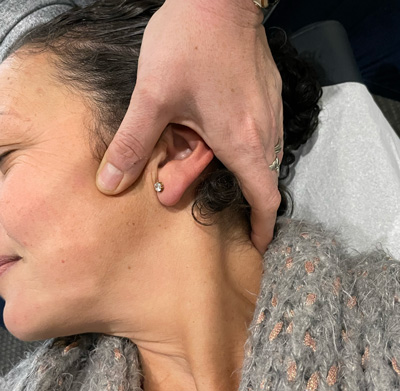Do you grind or clench your teeth?
Does your jaw pop, click or stop you from eating certain foods?
Do you have constant headaches that have been investigated but no cause has been found?
Do you get pain behind the eyes? Pain into the neck and shoulders?
Do you have dizziness, buzzing or ringing in the ears with no known cause?
If any of these sound like you, then you may be suffering from a TMJ (jaw) disorder.
What is TMJ disorder?
TMJ stands for Tempo-mandibular joint, otherwise known as your jaw joint.
 |
There are 2 joints at the front of the ear. The joints that connect the lower jaw bone – called the mandible to the temporal bones of the skull on each side of the head. The muscles that control the joints are attached to the mandible and allow the jaw to move in three directions: up and down, side to side, and forward and back. The joints work together to produce the proper movement. In between the 2 joints is a soft tissue disc that fits in the socket. The disc absorbs the shock to the joint from chewing and other movements. |
Research has shown that TMJ disorders aren’t just solely confined to the jaw and teeth.
It is a complex multi system condition involving the circulatory, digestive, endocrine, exocrine, immune, muscular, nervous, reproductive, respiratory, and the skeletal systems.
85% of patients with TMJ also suffer from other conditions – pain and non-pain conditions in other parts of the body
These conditions may also include sleep conditions such as:
- grinding or clenching,
- allergies,
- chronic fatigue syndrome,
- chronic headache,
- endometriosis,
- fibromyalgia,
- irritable bowel syndrome,
- neck and
- lower back pain.
Autoimmune conditions such as Rheumatoid Arthritis and Psoriatic Arthritis can also affect the TMJ joint.
TMJ disorders can be debilitating
If your TMJ is compromised, depending on the severity, this can affect a person’s ability to speak, chew, swallow, make facial expressions, and even breathe.
Causes of TMJ issues:
The main reasons for TMJ issues could involve the following:
· Injuries to the jaw area – sporting injuries, getting hit to the jaw or head (eg. Boxing, football)
· Dental procedures or times where prolonged mouth opening is required.
· Autoimmune diseases (eg. Rheumatoid arthritis)
· Infections
· Insertion of a breathing tube before surgery
· Various forms of arthritis – including osteoarthritis
Did you know that Chiropractors may be able to help treat mechanical issues associated with the TMJ ?
We focus to align the head, neck and jaw to ease the pressure on surrounding structures.
We work on muscles in the area to release them, so they don’t keep pulling the joints out of place.
If you’re experiencing pain in the TMJ region please come see us for an assessment as we may be able to help.

Dr Anna Kubicki is a graduate from RMIT University with a double Bachelor degree (Bachelor of Clinical Science/Bachelor of Chiropractic Science) in 2006.

